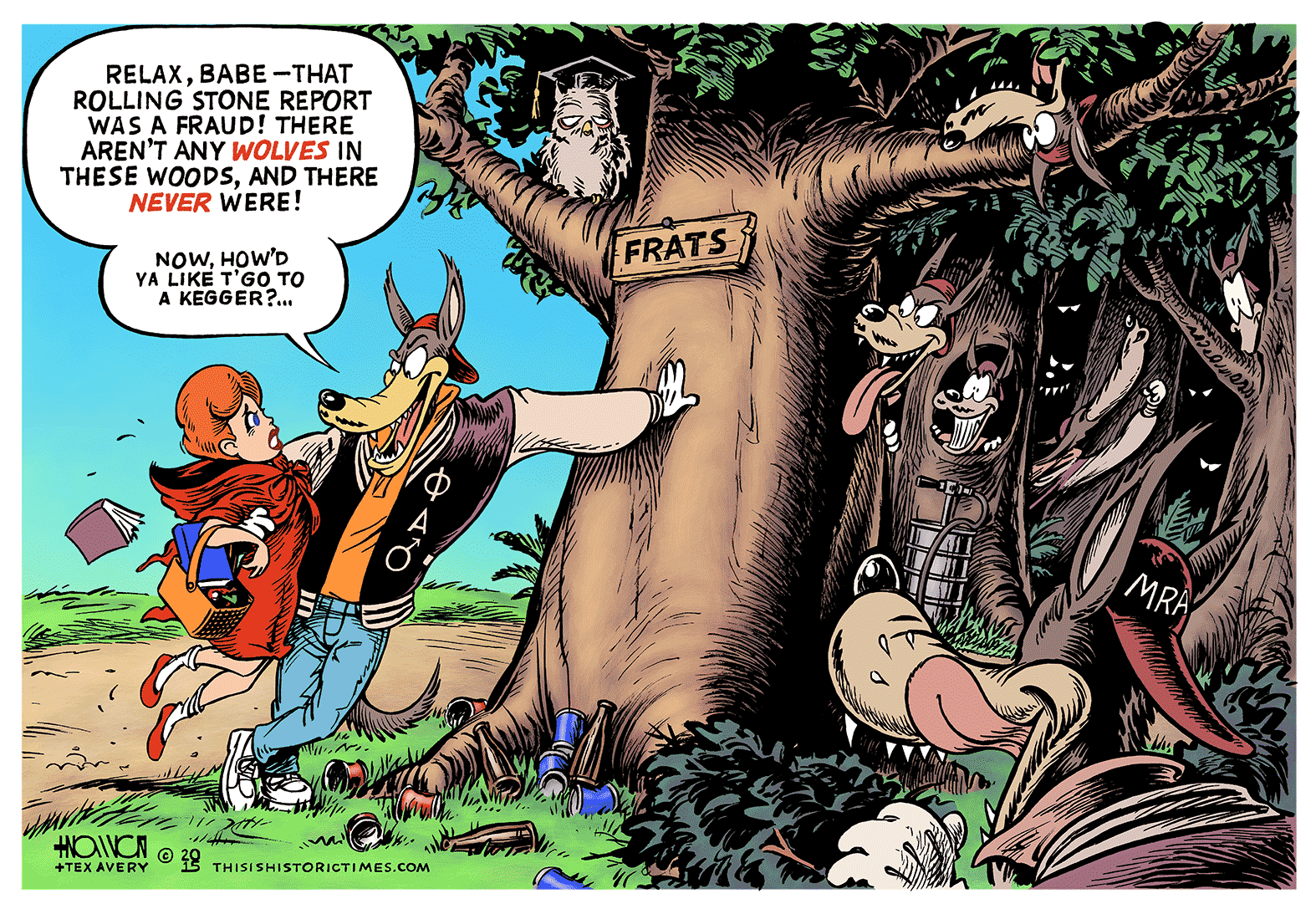
I’m super-late with this, but while the story that put the issue into the news-cycle is almost old enough to appear in a Mallard Fillmore comic, the fallout from that story and its over-arching themes are sadly still relevant, and probably won’t be going away anytime soon.
What made Rolling Stone‘s “A Rape on Campus” such a spectacular cock-up wasn’t just its failures of integrity at every editorial level, from the author’s initial investigations, all the way up to the editor-in-chief failing to fire anyone involved – or even its defamation of UVa’s Phi Kappa Psi fraternity, which is rightly pursuing legal action against the magazine and its publishers. After all, confirmation bias straight-up lies and vicious libel have become practically commonplace occurrences in popular journalism today, as fact-checking departments have steadily shrunk, and news organizations across the board have increasingly resorted to the style-over-substance tactics of grocery store checkout line tabloids in order to keep from losing market share to digital publications with theft-based business models, or random blogs with the same editorial standards as Fox News (i.e. “none”).
No, it’s that it harms the very people it set out to help – female victims of sexual assault and rape on college campuses, who already have a hard enough time even telling others what happened in the first place, due to the sensitive and extremely personal nature of the crime, and then are often hard-pressed to be believed and ultimately vindicated, due to long-standing cultural and institutional biases against women: “That’s what she gets for dressing so slutty”; “She’s just trying to get attention/revenge for something unrelated”; “She’s a finicky whore who changed her mind after the fact”; “If it’s a legitimate rape, the female body has ways to try to shut that whole thing down”.
I’ve seen some people actually react to this by insisting it proves campus rape is highly-exaggerated, or a myth, but as Jon Stewart observed on the Daily Show, campus rape is a very real, underreported problem that happens with shocking frequency, and is all-too-often swept under the rug by college and university administrators. Finding a story – any story – that would back up the title “A Rape on Campus” should have been relatively easy for someone as clearly determined as the report’s author, Sabrina Erdely – yet somehow, with numerous, verifiable assaults from which to choose, she and Rolling Stone managed to find the one that was totally made-up, like someone looking for a strand of hay in a stack of needles.
This goes back to what I was saying about style-over-substance: apparently, Erdely first came into contact with “Jackie,” the subject of the article, while asking members of a sexual assault survivors support group for something more lurid, after dismissing most of their more believable and certainly more likely stories as too mundane. In her quest for readers’ eyeballs, she lost sight herself of how a rape doesn’t need to be part of a snuff film-type scenario in order to be shocking – rape alone should be shocking enough, and the fact that it occurs with such frequency that it could be considered banal by anyone, under any circumstances, speaks volumes in itself!
Journalist Caitlin Flanagan, who wrote an exposé for Atlantic Magazine titled “The Dark Power of Fraternities: A yearlong investigation of Greek houses”, has said Erdely’s article could inhibit reforms of the Greek system, setting back such efforts as much as 30 years.
My cartoon addresses this angle of the story. The “male gaze” has been so ubiquitous in frat culture for so long that it comprises the entirety of one of the most famous individual scenes in the most famous movie about frats ever made, Animal House, which is nearly 40 years old, at this point.
Consequently, people laugh off behavior up to and including sexual assault as merely typical examples of how “boys will be boys”, and “hijinks” have to be as flagrant as dudebros creating a Facebook group in which to post nude pictures of unconscious, unconsenting women, or singing a cheerful ditty about lynching black people to result in national outrage.
Boy, Penn State and SAE sure are lucky this “Rape on Campus” flap came along when it did, eh?
The cartoon’s “wolf pack” metaphor is also meant to address the tribalistic or territorial nature of the Greek system, which is itself merely a single example of a larger problem of cronyism and cliquishness throughout higher education and the professional world. And even with the social benefits such tribes offer, only those in leadership positions (at best) can expect to derive the full privileges of membership while avoiding the most serious consequences, if somebody happens to drink him or herself to death, plummets from an upper-story balcony, or is implicated in a crime – as Flanagan’s exposé describes, well before guilt or innocence are established, members who find themselves in (that last scenario, at least) will often be immediately left to fend for themselves, like a wolf ejected from the pack for being too injured, sick, or weak.
Many readers will probably recognize the characters in my cartoon as borrowed from Tex Avery’s classic “Red Hot Riding Hood” short. I have no idea what Avery’s views on my usage would be, so the standard disclaimers apply.
The post Big Bad on Campus appeared first on This is Historic Times.